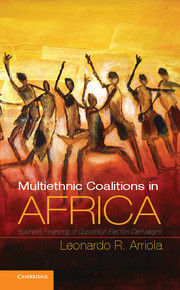Book contents
- Frontmatter
- Contents
- List of Figures
- List of Tables
- Preface and Acknowledgments
- List of Abbreviations
- 1 The Puzzle of Opposition Coordination
- 2 A Theory of Pecuniary Coalition Formation
- 3 The Emergence of Financial Reprisal Regimes
- 4 The Political Control of Banking
- 5 The Liberalization of Capital
- 6 The Political Alignment of Business
- 7 Opposition Bargaining across Ethnic Cleavages
- 8 Multiethnic Opposition Coalitions in African Elections
- 9 Democratic Consolidation in Africa
- Appendix A Commercial Banking Sector Size and Multiethnic Opposition Coalitions in Africa
- Appendix B Sources on Commodity Exports and Ethnic Production by Country
- Appendix C Variables: Definitions, Sources, and Summary Statistics
- Appendix D Multiethnic Opposition Coalitions in Africa, 1990–2005
- References
- Index
1 - The Puzzle of Opposition Coordination
Published online by Cambridge University Press: 05 November 2012
- Frontmatter
- Contents
- List of Figures
- List of Tables
- Preface and Acknowledgments
- List of Abbreviations
- 1 The Puzzle of Opposition Coordination
- 2 A Theory of Pecuniary Coalition Formation
- 3 The Emergence of Financial Reprisal Regimes
- 4 The Political Control of Banking
- 5 The Liberalization of Capital
- 6 The Political Alignment of Business
- 7 Opposition Bargaining across Ethnic Cleavages
- 8 Multiethnic Opposition Coalitions in African Elections
- 9 Democratic Consolidation in Africa
- Appendix A Commercial Banking Sector Size and Multiethnic Opposition Coalitions in Africa
- Appendix B Sources on Commodity Exports and Ethnic Production by Country
- Appendix C Variables: Definitions, Sources, and Summary Statistics
- Appendix D Multiethnic Opposition Coalitions in Africa, 1990–2005
- References
- Index
Summary
You cannot fight fairly against a candidate who is in power if you are divided, especially in Africa.
Blaise Compaoré, president of Burkina Faso, 2005Democracy seems to break down all too easily in multiethnic societies. While electoral competition can generate democracy’s most desirable attributes, this competitive mechanism is widely thought to fail wherever politicians and their parties become identified by ethnicity. Democracy obviously can collapse if the competition between ethnic parties degenerates into a violent confrontation over control of the state. But democracy usually disintegrates through subtler means. It begins when incumbents face too little competition rather than too much. Incumbents who confront an ethnically divided opposition effectively have insufficient competition. And if they do not fear losing elections, incumbents do not have much incentive to be responsive to their citizens, to craft better policy, or to respect institutional constraints. Electoral competition in multiethnic societies, to be meaningful, requires opposition coordination across ethnic cleavages.
The potential impact of opposition coordination is readily apparent in the countries of Sub-Saharan Africa, where opposition politicians have routinely divided along ethnic lines when challenging incumbents through multiparty elections. In Gabon, President Omar Bongo, Africa’s longest-serving ruler, died in 2009 after having defeated an ethnically fragmented opposition in three elections since the transition to multipartism in 1990. Because the personalized clientelistic networks used by Bongo to stay in power were disrupted by his death, the election held to replace the deceased president offered an unparalleled opportunity to bring about the country’s first democratic alternation. Yet, his son and designated successor, Ali Bongo Ondimba, managed to keep the incumbent regime in power by winning 42% of the vote against an opposition that split its support between two rivals who each garnered a quarter of the vote.
- Type
- Chapter
- Information
- Multi-Ethnic Coalitions in AfricaBusiness Financing of Opposition Election Campaigns, pp. 1 - 26Publisher: Cambridge University PressPrint publication year: 2012



